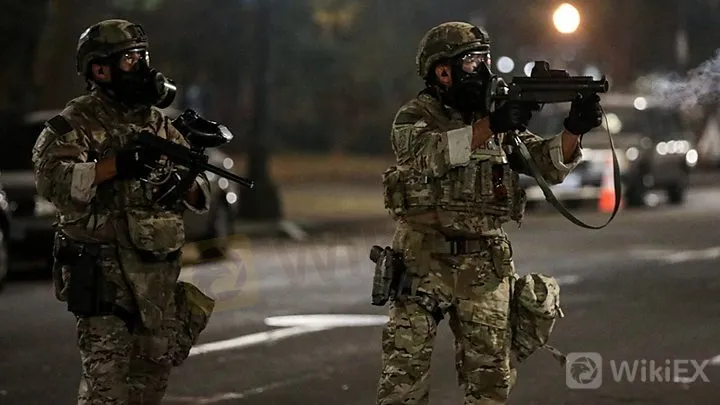简体中文
繁體中文
English
Pусский
日本語
ภาษาไทย
Tiếng Việt
Bahasa Indonesia
Español
हिन्दी
Filippiiniläinen
Français
Deutsch
Português
Türkçe
한국어
العربية
Portland protests: Federal forces ready for phased pull-out
Abstract:Image copyrightGetty ImagesImage caption The presence of federal law enforcement officers on the str
Image copyrightGetty ImagesImage caption
The presence of federal law enforcement officers on the streets of Portland is controversial
The Trump administration is planning to withdraw some federal security forces from Portland, Oregon, after weeks of clashes with protesters.
US Homeland Security Secretary Chad Wolf said the pull-out was conditional on local police protecting federal buildings, the focal point of unrest.
Oregon Governor Kate Brown said federal agents would start leaving the state's biggest city from Thursday.
Portland has been rocked by 62 consecutive days of demonstrations.
What did federal and state officials say?
In his statement, the US homeland security secretary set no timeline for a pull-out.
But he said he and the governor had “agreed to a joint plan to end the violent activity in Portland directed at federal properties and law enforcement officers”.
“That plan includes a robust presence of Oregon State Police in downtown Portland.”
He added that “state and local law enforcement will begin securing properties and streets, especially those surrounding federal properties, that have been under nightly attack”.
Is it legal to send in federal forces?
Trump's crackdown on Portland protests explained
The governor tweeted on Wednesday: “They have acted as an occupying force & brought violence. Starting tomorrow, all Customs and Border Protection & ICE officers will leave downtown Portland.”
But she added that federal officers from the US Marshals Service and Federal Protective Service will stay at the courthouse, where they are usually based.
After the announcement, Mr Trump, a Republican, declared victory, tweeting: If the Federal Government and its brilliant Law Enforcement (Homeland) didn't go into Portland one week ago, there would be no Portland.
“It would be burned and beaten to the ground. If the Mayor and Governor do not stop the Crime and Violence from the Anarchists and Agitators immediately, the Federal Government will go in and do the job that local law enforcement was supposed to do!”
Image copyrightGetty ImagesImage caption
Federal officers attempted to disperse crowds as they started to gather earlier in the evening on Monday
What happened in Portland?
Federal officers were sent there on 4 July to protect federal buildings that were vandalised during weeks of protests against racism and police brutality following the death of George Floyd, an unarmed black man, in Minneapolis, Minnesota, in May.
Their deployment exacerbated the civil unrest, especially when footage emerged of demonstrators being grabbed off the street by federal officers and forced into unmarked cars.
The governor and Portland Mayor Ted Wheeler, both Democrats, complained they never asked for the federal intervention, blasting it as an election-year stunt by the US president.
The Mark O Hatfield Federal Courthouse in the city centre has become a nightly battleground, with both federal officers and demonstrators injured in bloody confrontations.
According to oregonlive.com, medics, journalists and legal observers have also been hurt by rubber bullets and pepper balls fired by the federal officers.
In tandem with the crackdown in Portland, the Trump administration has sent in federal agents to several Democratic-run US cities rocked by rising gun crime: Chicago, Kansas City and Albuquerque.
The US Department of Justice said on Wednesday it would also send federal officers to three more Democratic-run US cities - Cleveland, Detroit and Milwaukee - owing to “disturbing increases in violent crime, particularly homicides”.
More about the Portland protests
Trump's crackdown on Portland protests explained
Does Trump have the right to send in federal forces?

Media playback is unsupported on your device
Media captionPortland protests: Calls for federal troops to leave US city
Disclaimer:
The views in this article only represent the author's personal views, and do not constitute investment advice on this platform. This platform does not guarantee the accuracy, completeness and timeliness of the information in the article, and will not be liable for any loss caused by the use of or reliance on the information in the article.
WikiFX Broker
Latest News
High-Potential Investments: Top 10 Stocks to Watch in 2025
US Dollar Insights: Key FX Trends You Need to Know
Why Is Nvidia Making Headlines Everywhere Today?
Discover How Your Trading Personality Shapes Success
FINRA Charges UBS $1.1 Million for a Decade of False Trade Confirmations
Bitcoin in 2025: The Opportunities and Challenges Ahead
BI Apprehends Japanese Scam Leader in Manila
Big News! UK 30-Year Bond Yields Soar to 25-Year High!
SQUARED FINANCIAL: Your Friend or Foe?
Join the Event & Level Up Your Forex Journey
Currency Calculator






